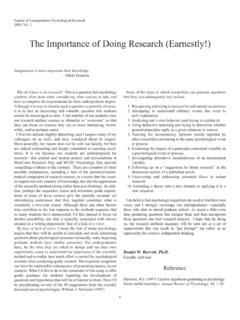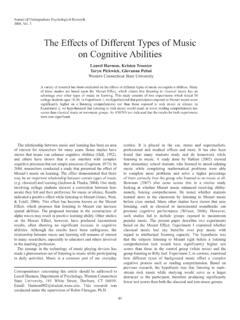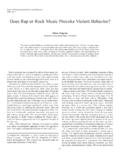Transcription of The Effect of Television on Time Spent Completing an ...
1 It is almost common practice for school age children to placethemselves in front of the Television to begin their into any house or dorm room across the country to findchildren from elementary school kids through college seniorsflipping through their text books while navigating through thechannels of the local cable system. Many of these students willargue that leaving a Television or radio on during their studiesdoes not distract them from getting any work completed. In factsome may argue that it helps them to concentrate and that thetelevision acts as a form of white noise; that is, it blocks out otherpossible distracting noises. It seems that the only people whoseem to disagree with this idea are teachers and parents; andtherefore researchers have attempted to figure out if televisionreally does have an Effect on studies have focused on the effects of watching and/orlistening to Television and radio on homework.
2 Cool, Yarbrough,Patton, and Runde (1994) gave their participants a specificamount of time to finish a set of questions and exposed theirparticipants to Television , radio or relative silence (Cool et al.,1994). They found that significantly fewer questions wereanswered in the time given when the participant was exposed tothe Television , as compared to the radio or relative , they found that when participants were exposed toall three levels sequentially (TV, radio and relative silence)during the given time, participants shown the Television firstanswered fewer questions than participants who were givensilence or radio first (Cool et al., 1994). Another study focused specifically on soap operas and theireffects on studying (Pool, Koolstra, & Van Der Voort, 2003). Intheir study, Pool, et al., placed participants in one of threeconditions: visual soap operas, an audio soundtrack of soapoperas, or no Television or sound, and gave all participants memorization assignments.
3 Results showed that the partici-pants under the visual condition needed more time to completethe assignment than participants under the audio only and controlconditions. Furthermore, after observing half of the participantsduring the study, the observational data showed that the increasedtime was due to the participants looking away from theassignment to look at the Television (Pool, Koolstra, & Van DerVoort, 2003).Similar to the studies by Pool et al. (2003) and Cool et al. (1994)was a study by Patton, Stinard and Routh (1983) to determinewhat, if anything, was considered distracting during homework in real life settings. Experimenters distributed questionnaires tohomes of 387 students in grades 5 through 9, and asked that theybe filled out at home and returned to the experimenters. Patton etal. measured the amount of time Spent Completing the homeworkassignments and under what conditions the students tended tostudy ( in front of the Television , with the radio on, relativesilence).
4 Results showed again that Television was a significantdistracter from homework. Results such as these can often be explained by differentattention theories. Capacity theory hold that when the brain isexposed to two separate tasks that both require focused attention,such as watching Television and Completing a homeworkassignment, that attention is divided and performance in one orJournal of Undergraduate Psychological Research2007, Vol. 2 The Effect of Television on Time Spent Completing an AssignmentTina SimcoeMelinda L. SamahaWestern Connecticut State UniversityThis study was designed to examine the effects of watching Television on the amount of time it takes tocomplete a given assignment. Twenty participants were given an assignment to complete and were timed. Halfof the participants were exposed to Television while the other half of the participants were not.
5 Significantdifferences were found between the two groups such that exposure to Television significantly lengthened theamount of time it took to complete the given assignment. 40 Correspondence concerning this article should be addressed toTina Simcoe, 166 Old Brookfield Rd 23-3, Danbury, : This research wasconducted under the supervision of Robin Flanagan, EFFECTOF Television ON TIME41both of the tasks is diminished: If a task is difficult, dividedattention is sometimes not possible (Goldstein, 2005, ). All three studies have come to similar conclusions about theeffects of Television on studying. However all previous studieswere administered to elementary and middle school age childrenand no experiments were found that related to college agestudents and the Effect of Television on their studies. Also allprevious studies focused on the number of questions answered ina given amount of time.
6 This study is different in that the time,not the number of questions being answered, is the dependentvariable of interest. The current study aimed to show thatwatching Television while Completing an analog homeworkassignment would change the amount of time it takes to completean assignment for college aged students . It was hypothesized thatthe presence of the Television shows would increase the amountof time it takes for the participants to finish the given assignment. MethodParticipantsParticipants in this study were a convenience sample of twentyundergraduate students currently enrolled at a public students volunteered for the study via a sign upsheet posted in the Psychology Department. Participants receivedclass credit for participating in the were given an informed consent and an envelopecontaining a small amount of reading material (see Appendix A),followed by a set of questions pertaining to the reading (seeAppendix B).
7 The reading material consisted of a short articlefound in a health magazine about the effects of exercise oncancer patients during treatment. Following this were questionsabout the reading with no interpretation needed. The reading andsubsequent questions were stapled to one another in such a waythat the participants were made to read the article before seeingthe questions. Each participant was given the exact same set of shows consisting of a variety of MTV, american idol , and Cops, was shown to half of the other half were not given any Television distraction duringthe course of the Television shows were shown on anoverhead projector at the front of the room so that all of theparticipants in the Television condition could see and hear it. Adigital clock was placed at the front of the room and participantswere asked to use this clock to answer any questions pertaining were seated facing the front of the room and giventhe consent forms to sign.
8 Once all of the consent forms weresigned and collected the envelopes containing the reading (seeAppendix A) and the questions (see Appendix B) were distributedand participants were asked to open the packet and follow thedirections. At this point the time on the digital clock wasrecorded to ensure that all participants began at the same the participants who received the distraction the televisionwas begun at the same time. The independent variable, in thiscase the Television , was controlled by presenting the televisionshows to every other group participating in the study, whichensured for random assignment to groups. It was then explainedto all participants the importance of not talking to one anotherthroughout the course of the helped to control anyextraneous distractions that might confound the results of thestudy. It was important that the only distraction was the televi-sion, and that there were not distractions in the no tv were also informed that they were free to leave as soon asthey had finished their questions.
9 The final question on the ques-tionnaire asked them to record the time at which they finished thequestionnaire. Once the times had been collected from the answersheets, the recorded times became the dependent variable. ResultsFor purposes of this study time was measured in minutes andthe data was analyzed using a one sample t-test. Analysis showedthat the Television group (M= , SD= ) took longer tofinish the article and questionnaire than the non Television group(M= , SD= ), t(18) = , p< .05. DiscussionThis study found that Television did indeed significantlyincrease the amount of time it took to complete an of this study were consistent with previous studies doneregarding Television and its effects on assignments. It was foundthat many of the participants under the Television condition tooktime to look up at the Television screen. This seemed to be the keyreason behind the extended length of time that it took to completethe assignment.
10 This finding is consistent with the study done byPool et al. (2003), where participants looked up from theassignment to watch Television . In looking up to the Television thebrain is experiencing divided attention and therefore both tasksare being diminished. Capacity theory would explain this as anoverload to the amount of space allocated to resources. Thesuccessfulness of the task is directly proportional to the amountof resource being used. The more resource being used then theless successful is the completion of the task correctly. Otherstudies focused on the number of questions answered in aspecific amount of time (Cool, et al., 1994; Patton, 1983). Thisstudy was different in that all questions were answered and theparticipants were timed. However measured, time or number ofquestions answered, the results were consistent in that televisionhad a negative Effect on homework.




